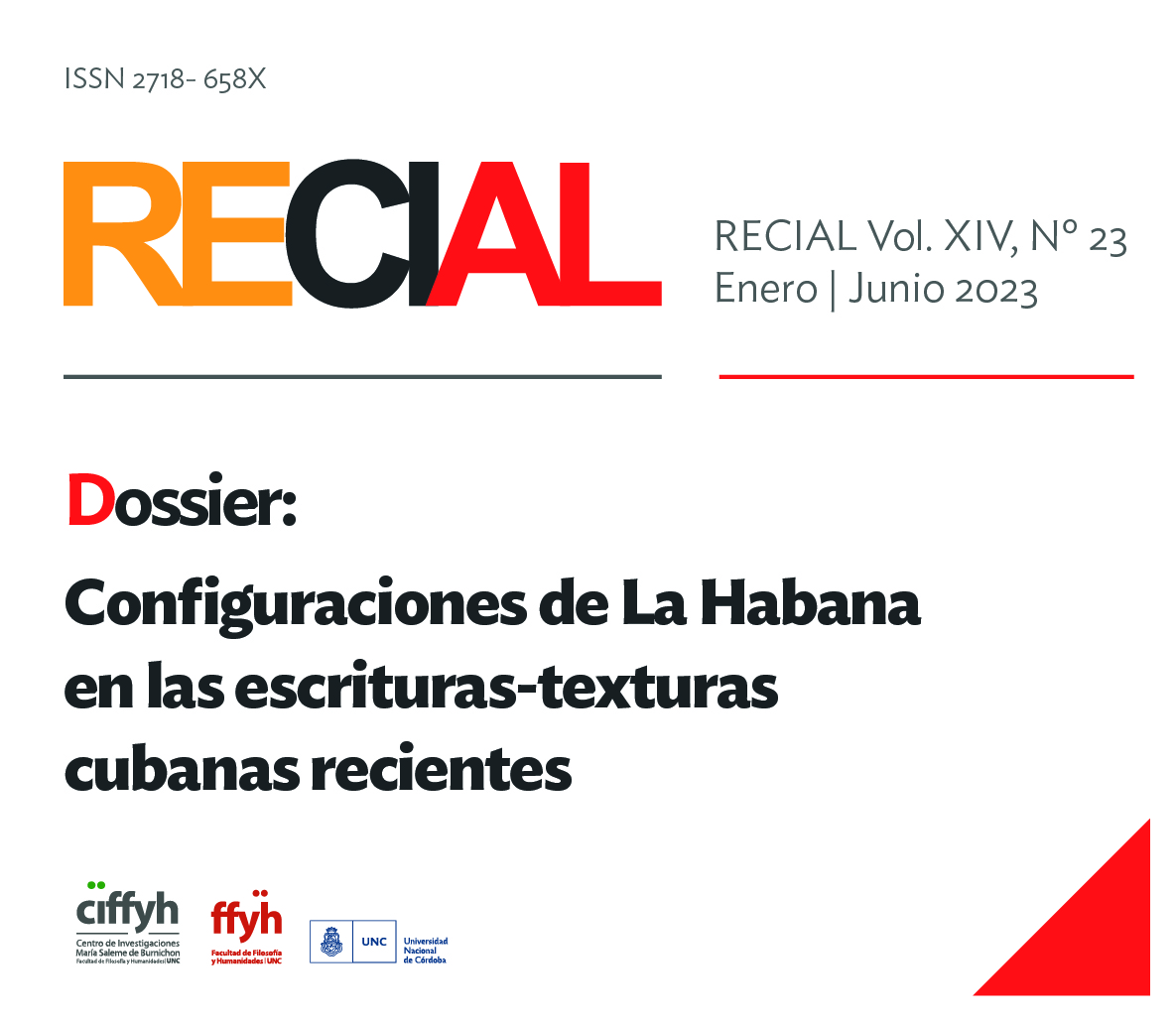On the Art of Not Belonging: the Post-exile Experience in Magali Alabau's We have Arrived at Ilión
DOI:
https://doi.org/10.53971/2718.658x.v14.n23.41363Keywords:
Magali Alabua, Cuban poetry, twentieth century, post-exile, cityAbstract
In the poem-book We have arrived at Ilión (1992), Magali Alabau (Cienfuegos, 1945) recounts the trip back to Havana that she made twenty years after going to live in the United States. Reissued again in 2013 by Editorial Betania in Madrid, the text does not lose validity as a contemporary account of the Cuban diaspora. This paper offers a reading of the poem in light of the notion of post-exile as developed by Alexis Nouss (2015), integrating the contributions of the social sciences in the perspective of comparative literature. On the one hand, we examine the various strategies that converge in the ghostly representation of the city, where spatial references intersect with mythological ones, highlighting the void left by the absent. On the other, we analyze some factors that define the status of the poetic speaker as a subject of post-exile in Alabau's long poem.
References
Aínsa, F. (2010). Fragmentos para una poética de la extranjería. En Cécile Chantraine-Braillon, Norah Giraldi Dei Cas y Fatiha Idmhand (Eds.), El escritor y el intelectual entre dos mundos. Lugares y figuras del desplazamiento (pp. 23-44). Madrid-Frankfurt: Iberoamericana-Vervuert.
Alabau, M. (1992/2013). Hemos llegado a Ilión. Madrid: Betania. Reedición de 2013.
___ (2011). Hemos llegado a Ilión. En Milena Rodríguez Gutiérrez (Edición, introducción, notas y bibliografía), Otra Cuba secreta. Antología de poetas cubanas del XIX y del XX (pp. 460-473). Madrid: Verbum.
Arcos, J. L. (1992). La poesía de Raúl Hernández Novás. Para una poética de la materia. Anuario L/L, Volumen 23, 41-84. Recuperado de https://rid.unrn.edu.ar/bitstream/20.500.12049/4812/3/Arcos-Poes%C3%ADa%20de%20Nov%C3%A1s%2C%20Anuario-1-44.pdf
Benjamin, W. (2010). Imágenes que piensan, Libro IV, Volumen 1, Obras. Madrid: Abada.
Brecht, B. (2004). Die Gedichte in Einem Band, Elisabeth Hauptmann (ed.). Frankfurt am Main: Suhrkamp.
Brodsky, J. (1990). The Condition We Call «Exile». En John Glad (ed.), Literature in Exile, (pp. 100-109). Durham y Londres: Duke University Press. Recuperado de https://www.amherst.edu/system/files/media/1622/ConditionWeCallExile.pdf
Butler, J. (2006). Vida precaria. El poder del duelo y la violencia. Buenos Aires: Paidós.
Cabrera, Y. (2013). Electra, Clitemnestra: el mito y el doble en la poesía de Magali Alabau. La Habana Elegante Segunda Época, s/p. http://www.habanaelegante.com/Spring_Summer_2013/Dossier_Poetas_Cabrera.html
___ (2020). Magali Alabau: «me interesan las personas, no la literatura. Deinós. Critical Journal, 25 de agosto de 2020, s/p. https://deinospoesia.com/2020/08/25/magali-alabau-me-interesan-las-personas-no-la-literatura/
Cañas, D. (1994). El poeta y la ciudad. Nueva York y los escritores hispanos. Madrid: Cátedra. Recuperado de http://dionisioc.com/descargas/1994%20El%20poeta%20y%20la%20ciudad.pdf
Chejfec, S. (2017). La música de las anomalías. En Autor, El visitante (pp. 127-140). Buenos Aires: Editorial Excursiones.
Derrida, J. (2012). Espectros de Marx: el Estado de la deuda, el trabajo del duelo y la nueva Internacional. Traducción de José Miguel Alarcón y Cristina de Peretti. Madrid: Trotta.
Ingenschay, D. (2010). Exilio, insilio y diáspora. La literatura cubana en la época de las literaturas sin residencia fija. Ángulo Recto. Revista de estudios sobre la ciudad como espacio plural, vol. 2, no. 1. https://revistas.ucm.es/index.php/ANRE/article/view/ANRE1010120004A/6101
Manzoni, C. (2007). Diáspora, nomadismo y exilio en la literatura latinoamericana contemporánea. Digital Repository of the University of Texas, s/p. https://repositories.lib.utexas.edu/bitstream/handle/2152/4102/manzoni.pdf?sequence=2&isAllowed=y
Nouss, A. (2015). La condition de l’exilé. Penser les migrations contemporaines. París: Éditions de la Maison de Sciences de l’Homme.
Pérez Firmat, G. (2000). Vidas en vilo: la cultura cubanoamericana. Madrid: Colibrí.
Puppo, M. L. (2013). Entre el vértigo y la ruina. Poesía contemporánea y experiencia urbana. Buenos Aires: Biblos.
Rodríguez Gutiérrez, M. (2013). Magali Alabau es Perséfone Pérez o cómo volver a Ilión. Prólogo a Magali Alabau, Hemos llegado a Ilión (pp. 7-20). Madrid: Editorial Betania.
___ (2022). Dos poéticas del exilio cubano. Nivaria Tejera y Magali Alabau: París / Nueva York, o el espacio que no es. Mitologías hoy: Revista de pensamiento, crítica y estudios literarios latinoamericanos, no. 25, 150-162. https://revistes.uab.cat/mitologias/article/view/v25-rodriguez
Steiner, G. (2002). Extraterritorial. Ensayos sobre literatura y la revolución lingüística. Madrid: Ediciones Siruela.
Tejera, N. (1983). Rueda del exiliado. Poemas y dibujos de Nivaria Tejera. Lisboa.
Viera, F. L. (2012). Magali Alabau, Nueva York. Revista Cubaencuentro, vol. 16, no. 1. https://www.cubaencuentro.com/txt/entrevistas/articulos/magali-alabau-nueva-york-272919
Zambrano, M. (2014), Carta sobre el exilio. En Juan Fernando Ortega Muñoz (ed., introducción y notas), El exilio como patria (pp. 3-13). Madrid: Anthropos.
Downloads
Published
Issue
Section
License

This work is licensed under a Creative Commons Attribution-NonCommercial-ShareAlike 4.0 International License.
Aquellos/as autores/as que tengan publicaciones en esta revista, aceptan los términos siguientes:
- Los/as autores/as conservarán sus derechos de autor y garantizarán a la revista el derecho de primera publicación de su obra, el cuál estará simultáneamente sujeto a la Licencia de reconocimiento de Creative Commons que permite a terceros compartir la obra siempre que se indique su autor y su primera publicación esta revista.
- Los/as autores/as podrán adoptar otros acuerdos de licencia no exclusiva de distribución de la versión de la obra publicada (p. ej.: depositarla en un archivo telemático institucional o publicarla en un volumen monográfico) siempre que se indique la publicación inicial en esta revista.
- Se permite y recomienda a los/as autores/as difundir su obra a través de Internet (p. ej.: en archivos telemáticos institucionales o en su página web), luego de su publicación en la revista. (Véase El efecto del acceso abierto).





